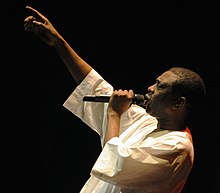Youssou N’Dour
| Youssou N'Dour | |
|---|---|

N'Dour in Warsaw on 13 September 2009
|
|
| Minister of Tourism of Senegal | |
|
In office 5 April 2012 – September 2013 |
|
| Prime Minister | Abdoul Mbaye |
| Preceded by | Thierno Lo |
| Personal details | |
| Born |
1 October 1959 Dakar, Senegal |
| Religion | Islam |
| Youssou N'Dour | |
|---|---|
| Birth name | Youssou Madjiguène N'Dour |
| Also known as | Youssou Ndour |
| Born | 1 October 1959 |
| Origin | Dakar, Senegal |
| Genres | Mbalax |
| Occupation(s) | Singer, percussionist |
| Years active | 1970s–present |
| Labels |
Chaos Recordings Real World Records Nonesuch Records |
| Website | youssou |
Youssou N'Dour (French pronunciation: [jusu nˈduʁ]; born 1 October 1959) is a Senegalese singer, songwriter, composer, occasional actor, businessman, and politician. In 2004, Rolling Stone magazine described him as, "perhaps the most famous singer alive" in Senegal and much of Africa. From April 2012 to September 2013, he was Senegal's Minister of Tourism.
N'Dour helped to develop a style of popular Senegalese music known in the Serer language as mbalax, which derives from the conservative Serer music tradition of "Njuup". He is the subject of the award-winning films Return to Gorée (2007) directed by Pierre-Yves Borgeaud and Youssou N'Dour: I Bring What I Love (2008) directed by Elizabeth Chai Vasarhelyi, which were released around the world.
In 2006, N'Dour was cast as Olaudah Equiano in the film Amazing Grace.
N'Dour was born in Dakar to a Wolof mother and a Serer father. He started performing at age 12 and was performing regularly with the Star Band, Dakar's most popular group during the early 1970s, within a few years. Several members of the Star Band joined Orchestra Baobab about that time.
Despite N'Dour's maternal connection to the traditional griot caste, he was not raised in that tradition, which he learned instead from his siblings. His parents' world view encouraged a modern outlook, leaving him open to two cultures and thereby inspiring N'Dour's identity as a modern griot.
...
Wikipedia
